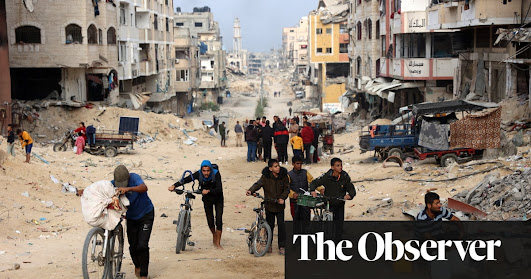 |
| 'Every child is me. Every mother and father is me': A glimpse of Gaza, occupation and genocide in Mosab Abu Toha’s new poetry collection, Forest of Noise |
Book
Club: In Forest of Noise, Palestinian poet Mosab Abu Toha explores the
pain, loss, and struggle of life in Gaza, while holding onto his
connection to home.
Later, in No Art — which echoes and responds to Elizabeth Bishop’s One Art (“The art of losing isn’t hard to master/so many things seem filled with the intent/to be lost that their loss is no disaster”) — Mosab writes:
"I’ve personally lost three friends to war,
a city to darkness, and a language to fear.
This was not easy to survive,
but survival proved necessary to master.
But of all things,
losing the only photo of my grandfather
under the rubble of my house
was a real disaster."
Writing after and in response to other English-language poets like Bishop, Whitman, Ginsberg, Bob Kaufman, and Mosab Abu Toha’s beloved late friend and mentor Refaat Alareer, the poet pushes against any notion that poetry must uplift and beautify — or that any poem can stand alone.
Of course, poets know their work is inspired by and in dialogue with other works. But today, individual poems have become standalone memes that many of us share on social media because we feel otherwise impotent to stop Israel’s violence against Palestinians.
Mosab’s unwillingness to hold any particular poem holy reminds us that poets’ conversations with each other, across time and space, among the living and the dead, hold more power than a single poem.
Take his response to Refaat Alareer’s well-loved poem of hope, If I Must Die (which echoes Claude McKay’s defiant 1919 resistance poem If We Must Die).
Refaat wrote of his own foretold passing, “You must live/to tell my story… let it bring hope/let it be a tale.”
Mosab brings another perspective by writing about the nightmare of always knowing you’re this close to dying: “If I am going to die,/let it be a clean death./No rubble over my corpse.”
He wants a funeral, something too many Palestinians have been denied, and clean, ironed clothes for his corpse. He wants the dignity of a nonviolent death.
He continues this logic in Rescue Plane, where he wishes for two planes: One to drop wheat, tea, and vegetables in Gaza and remove rubble. Another is to drop flowers for children to plant on graves. And then he strips away the flights of imagination and reveals his true, and truly simple, wish: “No planes at all.../No war/I wish we never had to wish.” ... READ MORE https://www.newarab.com/features/glimpse-gaza-mosab-abu-tohas-forest-noise
[AS ALWAYS PLEASE GO TO THE LINK TO READ GOOD ARTICLES (or quotes or watch videos) IN FULL: HELP SHAPE ALGORITHMS (and conversations) THAT EMPOWER DECENCY, DIGNITY, JUSTICE & PEACE... and hopefully Palestine]






















